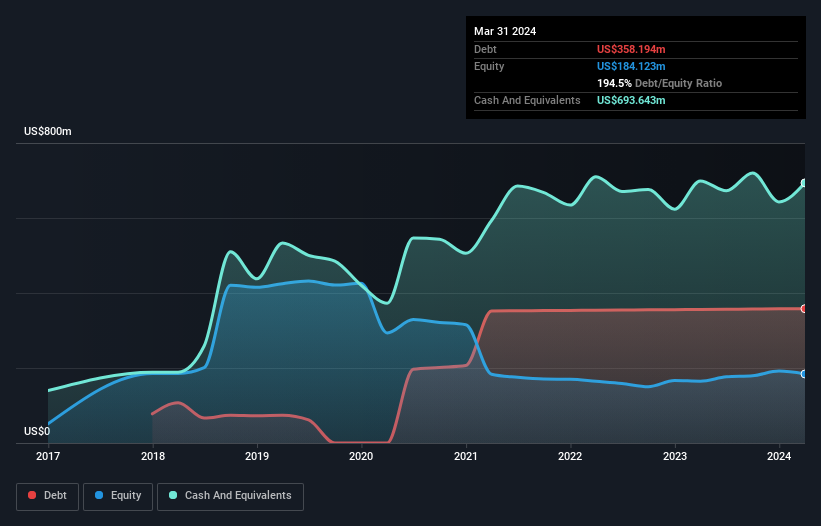
Legendary fund manager Li Lu (who Charlie Munger backed) once said, 'The biggest investment risk is not the volatility of prices, but whether you will suffer a permanent loss of capital.' So it might be obvious that you need to consider debt, when you think about how risky any given stock is, because too much debt can sink a company. We can see that Eventbrite, Inc. (NYSE:EB) does use debt in its business. But should shareholders be worried about its use of debt?
Why Does Debt Bring Risk?
Debt and other liabilities become risky for a business when it cannot easily fulfill those obligations, either with free cash flow or by raising capital at an attractive price. If things get really bad, the lenders can take control of the business. While that is not too common, we often do see indebted companies permanently diluting shareholders because lenders force them to raise capital at a distressed price. Of course, debt can be an important tool in businesses, particularly capital heavy businesses. The first step when considering a company's debt levels is to consider its cash and debt together.
See our latest analysis for Eventbrite
What Is Eventbrite's Net Debt?
The chart below, which you can click on for greater detail, shows that Eventbrite had US$358.2m in debt in March 2024; about the same as the year before. But it also has US$693.6m in cash to offset that, meaning it has US$335.4m net cash.

A Look At Eventbrite's Liabilities
We can see from the most recent balance sheet that Eventbrite had liabilities of US$403.6m falling due within a year, and liabilities of US$364.5m due beyond that. Offsetting these obligations, it had cash of US$693.6m as well as receivables valued at US$9.59m due within 12 months. So its liabilities outweigh the sum of its cash and (near-term) receivables by US$64.8m.
Of course, Eventbrite has a market capitalization of US$450.6m, so these liabilities are probably manageable. However, we do think it is worth keeping an eye on its balance sheet strength, as it may change over time. Despite its noteworthy liabilities, Eventbrite boasts net cash, so it's fair to say it does not have a heavy debt load! The balance sheet is clearly the area to focus on when you are analysing debt. But it is future earnings, more than anything, that will determine Eventbrite's ability to maintain a healthy balance sheet going forward. So if you're focused on the future you can check out this free report showing analyst profit forecasts.
In the last year Eventbrite wasn't profitable at an EBIT level, but managed to grow its revenue by 18%, to US$334m. That rate of growth is a bit slow for our taste, but it takes all types to make a world.
So How Risky Is Eventbrite?
We have no doubt that loss making companies are, in general, riskier than profitable ones. And we do note that Eventbrite had an earnings before interest and tax (EBIT) loss, over the last year. Indeed, in that time it burnt through US$644k of cash and made a loss of US$18m. While this does make the company a bit risky, it's important to remember it has net cash of US$335.4m. That means it could keep spending at its current rate for more than two years. Summing up, we're a little skeptical of this one, as it seems fairly risky in the absence of free cashflow. There's no doubt that we learn most about debt from the balance sheet. But ultimately, every company can contain risks that exist outside of the balance sheet. Be aware that Eventbrite is showing 1 warning sign in our investment analysis , you should know about...
If you're interested in investing in businesses that can grow profits without the burden of debt, then check out this free list of growing businesses that have net cash on the balance sheet.
Valuation is complex, but we're here to simplify it.
Discover if Eventbrite might be undervalued or overvalued with our detailed analysis, featuring fair value estimates, potential risks, dividends, insider trades, and its financial condition.
Access Free AnalysisHave feedback on this article? Concerned about the content? Get in touch with us directly. Alternatively, email editorial-team (at) simplywallst.com.
This article by Simply Wall St is general in nature. We provide commentary based on historical data and analyst forecasts only using an unbiased methodology and our articles are not intended to be financial advice. It does not constitute a recommendation to buy or sell any stock, and does not take account of your objectives, or your financial situation. We aim to bring you long-term focused analysis driven by fundamental data. Note that our analysis may not factor in the latest price-sensitive company announcements or qualitative material. Simply Wall St has no position in any stocks mentioned.
Have feedback on this article? Concerned about the content? Get in touch with us directly. Alternatively, email editorial-team@simplywallst.com
About NYSE:EB
Eventbrite
Operates a two-sided marketplace that provides self-service ticketing and marketing tools for event creators in the United States and internationally.
Undervalued with excellent balance sheet.
Similar Companies
Market Insights
Community Narratives



